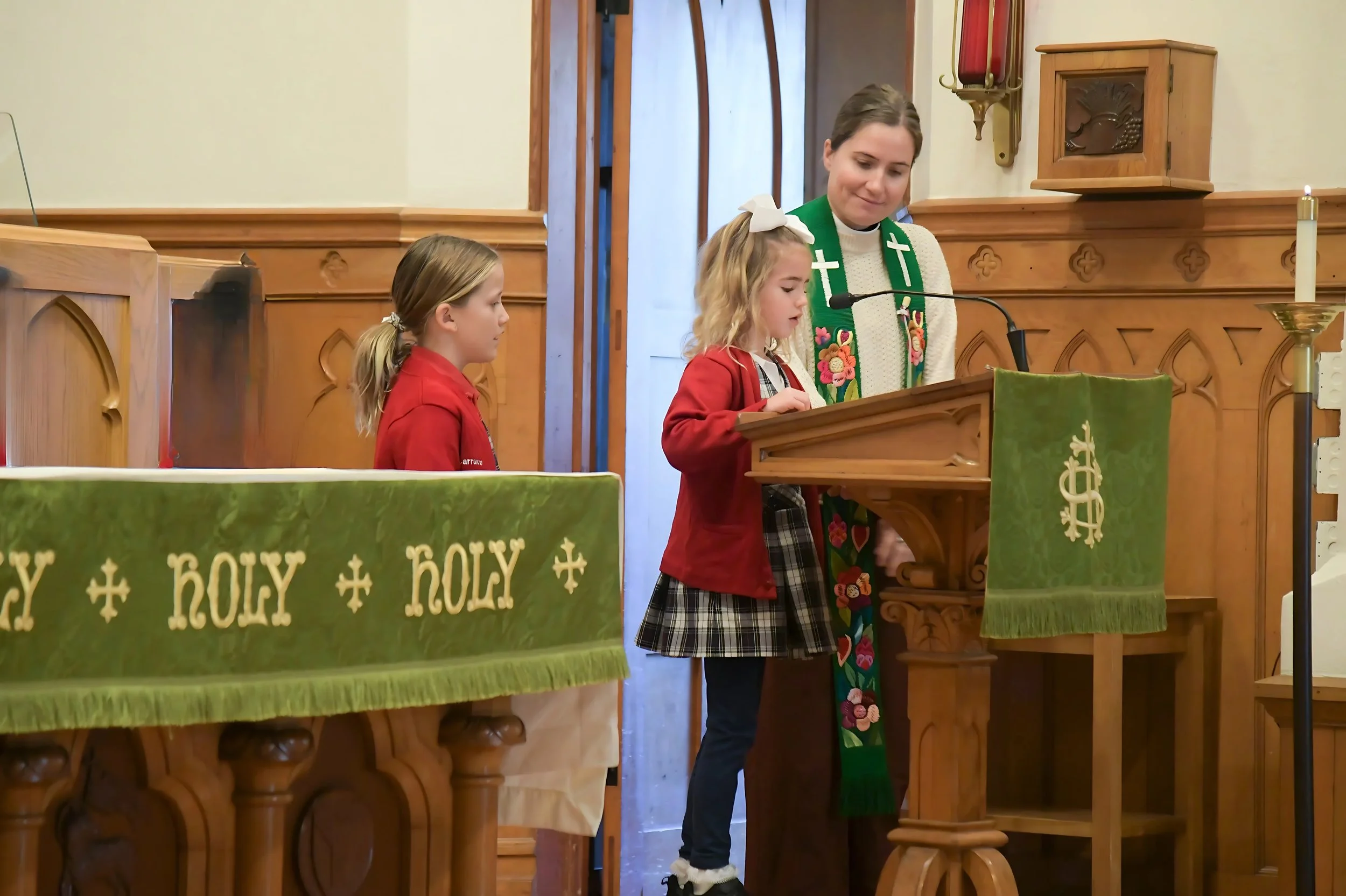Sharing the Hard Truth with Infinite Hope
Picture of Christina leading Chapel
Over the last couple of weeks, I have been teaching my elementary school students stories that tie-into our academic calendar, to help them understand why they are getting days off. We started with Martin Luther King, Jr. and followed up with St. Valentine.
I strongly believe in educating children about the reality of racism—especially through curriculum like Godly Play that is so thoughtfully crafted and theologically undergirded. Racism is part of our history and remains embedded in our culture today, and healing begins with being able to name this reality and learning to see it clearly. Yet, I feel such a heaviness and sadness that I could be the first person to introduce this concept to a child. What if hearing this story about the Rev. Dr. King is the first time a student ever considers the color of their skin, or notices the differences between themselves and their classmates? Or, even if they’ve heard about racism before, what if my story is the first time it really lands in their heart, mind, or body? It is a weighty responsibility to be a truth-bearer when the truth is something I wish didn’t exist.
As it turned out, many of my students did know about the Rev. Dr. King. I was delighted when one student who is multiracial began dancing in her seat when Rosa Parks came into the story. She already knew about Rosa Parks refusing to give up her seat on the bus for white passengers, even when it meant going to jail—and she celebrated it. She wanted to hear about it again. It was one of the stories making up the fabric of her young life, imparting courage to not accept injustices that have become an accepted norm. As another student put it, the story was about “doing the right thing, even when it is the wrong thing.”
I was also delighted when students began sharing quotes by the Rev. Dr. King they had memorized. They took turns speaking them aloud into our circle: “I have a dream that my four little children will one day live in a nation where they are not judged by the color of their skin but by the content of their character.” “We must accept finite disappointment, but never lose infinite hope.” “Darkness cannot drive out darkness; only light can do that.” I could feel these words lifting us up and connecting us.
When I shared the story with my first graders, one student, who had been actively listening and engaging, gave me a touching note after class. It said: “You are such a good teacher. I hope you love teaching.” It made me reflect that many children want someone to talk to them about real things. They are new to a big, chaotic world and want help knowing what is going on. Observant, sensitive children perceive the tensions around them, but don’t always know what questions to ask or whom to ask them. Which is where teachers and chaplains have, not just the heavy, burdensome task, but the privilege of naming the hard truths. We get to help shape our students’ understanding in a framework of love, justice, and compassion. We aren’t just passing on the truth of our collective brokenness, but passing on the infinite hope of healing.
This past week, I taught about St. Valentine in anticipation of Valentine’s Day. The story tells about Valentine, a doctor and a priest who prayed for his patients, healed them with herbs, and restored the sight of a blind girl. At the end of the story he is imprisoned for being a Christian and taken away by the jailers to be executed. The same first grader, who was once again actively engaged, looked perplexed and angry. She said, “This is just like last week’s story about Martin Luther King. They start out so good and then they go the wrong way. They have the wrong ending. It isn’t fair. They shouldn’t have been killed.”
I agreed. Both of these stories had unjust endings. (And isn’t it fascinating that Valentine, remembered centuries later for his love of others and God, was beheaded, and the Rev. Dr. King, remembered for working towards God’s beloved community on earth, was shot?) I went on to explain that we learn about these stories so we can help create new endings—ones that are fair. While there are unfair things in the world, we get to be part of making the world how we want it to be.
And that is all of our task—as chaplains, teachers, parents, and community members. To be bearers of truth, even when it means acknowledging hard realities. But we also bear the truth that hope, healing, and new beginnings are just as real, and can be even more powerful. Our role is to speak words that uplift and connect us within the circles we are part of—whether in our schools, families, or homes. The Rev. Dr. King often shared meals with his family, engaging in lively discussions with his children at the dinner table. He believed it was important to talk to children about real things, even when they were young. Perhaps your circle of influence can begin right at your dinner table, where you can share the truth with infinite hope and start creating new beginnings.

